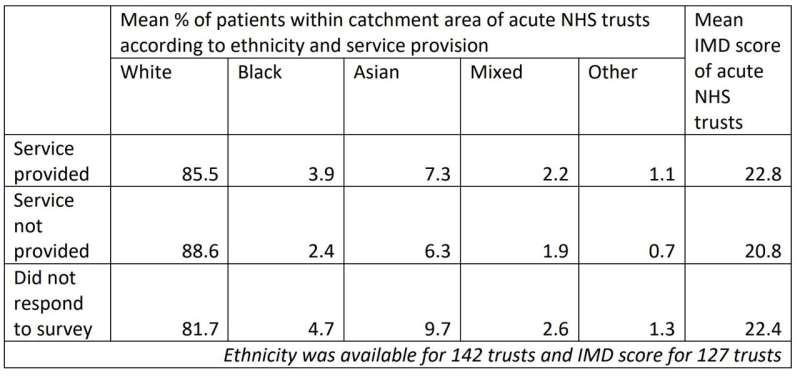Service provision according to catchment area characteristics of acute NHS trust. Credit: BMJ Open (2022). DOI: 10.1136/bmjopen-2022-061971
Over three quarters of acute NHS trusts in England (77%) do not have a child weight management service, despite being responsible for providing specialist services for the most severely obese, according to a study led by researchers at the University of Bristol and supported by the National Institute for Health and Care Research (NIHR).
The study, published in BMJ Open, also found considerable variation between geographical areas, with 36% of trusts in London, and 32% in the Northeast and Yorkshire providing services, compared with just 4% of trusts in the Midlands.
The Midlands had the lowest proportion of NHS trusts providing a weight management service (4%), despite the West Midlands having the highest prevalence of severe obesity according to 2019/2020 reception National Child Measurement Programme (NCMP) data.
The data were collected through Freedom of Information requests sent to 148 acute NHS trusts in England between March 2020 and March 2021. Most trusts (139; 94%) responded. Just 32 provided a child weight management service. It is the first time that the nature of child weight management services provided by acute trusts in England has been explored.
Multi-service and teaching trusts were more likely to provide a weight management service compared to other acute NHS trusts. The study also found a lack of consistency in funding sources and eligibility criteria for children to access services.
A multidisciplinary approach to child weight management service provision is recommended in national guidance, but the survey found that this was not routinely provided. There was no standardization of the service provided between trusts in terms of length of intervention, follow-up period and outcome measures.
Dr. Ruth Mears, Clinical Research Fellow from the Centre for Academic Primary Care at the University of Bristol, said, "One in five children in England is obese. The sparsely distributed acute NHS trust services revealed in our study will therefore only reach a minute fraction of children living with obesity or severe obesity."
"There needs to be a clear, realistic national strategy outlining who should receive priority for specialist multidisciplinary obesity care."
"Even the planned expansion of clinics, known as CEW clinics, for treating children with severe complications related to their obesity set out in the NHS Long Term Plan will not reach the majority of children who may require treatment in the future."
Julian Hamilton-Shield, Professor in Diabetes and Metabolic Endocrinology at Bristol Medical School: Translational Health Sciences, said, "The paucity of childhood weight management provision in many areas suggests that many children, young people and their families continue to face inequality in access for local secondary care facilities and will have no obvious route into the regional CEW clinics if needed."
More information: Ruth Mears et al, Cross-sectional survey of child weight management service provision by acute NHS trusts across England in 2020/2021, BMJ Open (2022). DOI: 10.1136/bmjopen-2022-061971
Journal information: BMJ Open
Provided by University of Bristol























